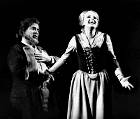ORFEO International – Reviews
Important Releases Briefly Introduced
February 2010
ORFEO 2 CD C 784 102 I
Verdi: Luisa Miller
It took a long time – more than 120 years – 
C 784 102 Ibefore Vienna’s opera fans were able to experience Verdi’s Luisa Miller (based on the spoken drama Kabale und Liebe by Friedrich Schiller) in its original Italian. This first performance did not take place until January 1974, though the impressive cast assembled for it could be said to have made up for the fact. 
Lilian Sukis
Christa Ludwig

Lilian Sukis
Malcolm Smith
Fotos: FayerIt is this production that can now be heard on CD. Under the baton of Alberto Erede, the orchestra of the Vienna State Opera gave a superb performance such as is sadly all-too-rare for Verdi’s early and middle-period works. The instrumental tone is supple and full of colour across the whole orchestra, which plays as it were in “high definition”, whether at dramatic climaxes or when accompanying the singers. But the protagonists themselves could hold their own too. Lilian Sukis sang the title role of the bourgeois girl Luisa – innocence personified, but doomed by the intrigues of her lover’s aristocratic family. Sukis was from Canada and had already in the 1960s sung at the New York Met. 
Lilian Sukis
Giuseppe Taddei
Foto: FayerShe here gives impressive proof of why she also acquired an excellent reputation in Europe as a lyric soprano. Her slender, but always open, floating voice is a joy in this portrayal of a young girl; here, any artificiality or affectation in the high notes would have been doubly damning. The role of the count’s son Rodolfo is played with lyric-dramatic aplomb by Franco Bonisolli, though without sacrificing nuance or elegance of tone in favour of his brilliant top notes. Giuseppe Taddei was ideal for the role of Miller, finding just the right tone for both the tender love of Luisa’s father and for his anger at those whom society has placed above him, and who misuse their position shamelessly to their own advantage. The villain in question, Count Walter, was given music by Verdi that was almost too “beautiful” for him, though this is no problem in Bonaldo Giaiotti’s authoritative characterization. And that even this powerful man is manipulated by his own secretary is evident from the portrayal by Malcolm Smith, whose bass voice is no less memorable. This extravagantly gifted team of singers is completed by Christa Ludwig as Rodolfo’s fiancée, Federica. She has a brief role with just two appearances, but Ludwig’s unmistakeable mezzo-soprano allows her to convey in succinct fashion the human aspect of this character, swaying as she does between sympathy and jealousy.
top |